Just three months ago, Norwegian Prime Minister Jonas Gahr Store addressed the UN Climate conference in Glasgow, COP26, telling delegates that the country was committed to climate action. "This is existential. It is urgent," said the Norwegian Prime Minister. "And it is possible--if we jointly step up our commitments." Store also promised to up the country's ambition and accelerate the transition to clean energy too.
These are fine words which help conjure a picture that Norway is a climate leader. But they are a mirage. Norway might claim to be leading the field when it comes to climate action, but in reality it is a climate laggard and still a fossil fuel pioneer. The devil is always in the details.
And those details are outlined in a new briefing released today, written by my colleague Silje Ask Lundberg, revealing that over the last ten years Norway has become Europe's "most aggressive explorer for new oil and gas."
Over the past decade, Norway has exponentially ramped up its exploration licensing, awarding as many exploration licences--700--as in the 47 years prior. From 2012 to 2021, new licences issued by Norway opened up 2.8 billion barrels of new oil and gas resources for potential extraction, almost 3.5 times more than Europe's second-largest producer, the United Kingdom.
Permitting development of oil and gas fields that are already licensed, but not yet producing, could lead to an additional 3 Gigatons of CO2 emissions globally. To put this into perspective, this is 60 times Norway's annual domestic emissions. New licensing could increase these emissions by 80 percent.
We know that the world's leading climate scientists have said that we should stop drilling for oil if we want a liveable future. Moreover, the world's energy watchdog, the International Energy Agency (IEA), also announced last year that allowing development of new oil and gas fields--let alone approving exploration for new oil and gas reserves--is incompatible with limiting global warming to 1.5degC.
But despite this Norway keeps drilling.
One such controversial development is the Wisting field, which is in the ecologically sensitive Arctic region of the Barents Sea. The field reportedly contains close to 500 million barrels of oil equivalent. Capital investments are huge and expected to be in the order of NOK 60-75 billion. It is being developed by Equinor.
If approved, the Wisting oil field would be the northernmost oil development not only in Norway, but also in the world.
But it gets worse. If approved, analysts believe the field could lead to emissions of more than 200 million tons of CO2, equivalent to the annual emissions of 50 coal-fired power plants. The climate impact of the Wisting field could be three times greater than that of the Cambo field, another controversial oil project, this time in the UK, which was paused late last year in the face of massive grassroots opposition in Britain.
"Staying below 1.5 degrees requires a rapid wind down of oil and gas production and it is wealthy producers like Norway that have the means and the responsibility to move first and fastest," said OCI senior campaigner, Silje Ask Lundberg, who is the author of the briefing. "Instead, Norway has in the last 10 years awarded as many exploration licences as in the 47 years prior. This rapid ramp up of oil and gas licensing is incompatible with climate leadership."
Frode Pleym of Greenpeace Norway added: "Norway is a poster child for climate hypocrisy. Every new exploration well and every new oil field that Norway allows undermines a well-planned just transition and is a step closer to climate chaos. Investments need to be redirected to scale up new, green industries across the country and ensuring a just transition so that every worker can retrain and move into a good green job."
The briefing is published here.

